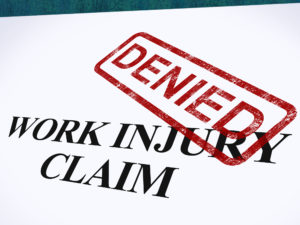Did the claims administrator deny your worker’s compensation claim? This can happen even when you do everything by the book, and even in the most obvious cases. However, just because your worker’s comp claim was denied, doesn’t mean you should give up.
State workers’ compensation systems aim to provide you with specific benefits in case of injury. These benefits are your right, and if your worker’s comp was denied, you can appeal. In this article, we are looking at why was your worker’s compensation denied, and what you should do to move forward.
Why Was Your Workers Compensation Denied?
Workers comp benefits are your right. However, your employer, or their insurance company, might try to deny your claim. Some reasons for denial are valid, but this does not mean you can appeal the denied claim.
The most common reasons why your worker’s compensation claim was denied include:
Missed Your Report or Filing Deadlines
In most states, you have to report your injury in writing within a few days. You should report the accident and your related injury to your supervisor as soon as it is possible. If you are unable to do that due to the injury, ask your legal representative or a close family member to do that on your behalf.
After you have reported your accident, you should then file a workers comp claim. Depending on your state and your position, you may have to file the claim yourself to the state agency or have your employer do it. In some states, only employers can file workers comp claims through their insurance carriers.
Different states have different deadlines for filling your worker’s comp claim. If you miss the deadline, your claim may be denied even if it was valid.
Dispute on the Nature of the Injury
You may only claim workers comp benefits for work-related injuries. If your employer claims that your injury did not happen because of a workplace injury, they may manage to invalidate your claim. This is also the case if your injury was caused by a preexisting condition that became aggravated at work.
To avoid these disputes, you need to present evidence that supports your claim. This is why legal support and proper documentation are crucial right after your accident. Witnesses, your doctor’s report, and your lawyer’s input can make or break your claim.
If your doctor has already ruled that your accident was work-related but the insurance carrier disagrees, you will need to get another round of medical exams.
However, your employer may also dispute the time and place of the accident even when they can’t deny it happened. They may also dispute whether you suffered any injury at all.
Another common dispute is recklessness. If your employer claims that the injury was due to your own reckless behavior, your claim might be denied.
Other Reasons for Denial
In addition to the above, your claim may be denied if it is considered non-compensable. For example, psychological stress or work-related mental trauma are difficult to prove. Your claim will also be denied if you failed to seek proper medical treatment, or if you made the claim after you left your job.
Reversing Your Denial
You should not panic if your initial claim was denied. The claims administrator will send you a letter that will include the reasons for your denial. Sometimes your worker’s comp denial was due to wrong paperwork or some other technicality.
If the letter is unclear, you may want to contact your claims administrator and ask for the details. However, unless your denial was due to a mistake, you will have to appeal your denial.
How to Appeal Your Claim
The first thing you must understand is that you will need legal support to appeal your claim. The method of appeal varies from state to state unless you are a federal employee covered by the Federal Employees’ Compensation Act.
With the aid of your legal expert, you should start by contacting your employer’s insurance carrier. Ask them why your benefits claim was denied, and if they were willing to revise their decision. If they decline your request, you should then file a formal appeal.
To file a formal appeal, you need to work with your worker’s compensation attorney to handle the appeal process. This is a complex legal process that varies by state and often requires a legal hearing. Your attorney will know how to deal with the process depending on the state you work in.
To help your attorney with the appeal process, you will need to provide medical documents, your letter of denial, and any eyewitness reports from your accident. In some states, a review board will examine your appeal, and you will need to provide them with as much proof as possible.
Your attorney will typically receive payment that depends on the amount of your claim. This is often percentage-based, so the higher your claim, the higher your attorney’s compensation will be. However, if your appeal fails, your attorney will not be paid at all, so you have nothing to lose.
Remember that not appealing your worker’s comp claims may cause you significant financial difficulties, especially if the injury incurs ongoing medical expenses.
Appealing a Worker’s Compensation Denied Claim
If you are wondering why was your worker’s compensation denied, you should seek legal help.
Here at Augusta Workers Comp, we are the foremost workers compensation experts in Augusta GA. We can aid you to file a claim, pursue an existing claim, and appeal a claim that has been denied. Contact us today to start your workers comp appeal process and claim the benefits you deserve.

